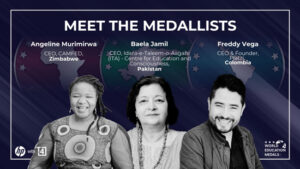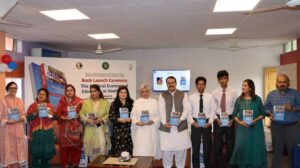Education, a fundamental
Baela Raza Jamil - Special Report - December 10, 2023
Radical inclusion strategies are needed to protect the fundamental right to education
Every year, December 10 is solemnly observed in Pakistan, and globally, to commemorate UN General Assembly’s adoption of the Universal Declaration of Human Rights in 1948. The UDHR’s thirty solid articles are core pillars of human dignity and entitlements extended to all children and adults universally. Many of us believe that education is an anchor enabling right in Article 24 of the UDHR, as is Sustainable Development Goal 4 for education, a catalyst to achieving all 17 goals of SDGs 2030.
Tragically, if ever a right that has been consistently denied to the children, the youth and the citizens of Pakistan it has been the right to education, in spite of its 2010 upgrade as a fundamental right mentioned in the constitution. The catalytic role of education has apparently eluded all our nation builders since 1947, including responsible groups within the state and society.
Recently, strategies adopted by Sierra Leone’s minister for basic and higher secondary education and chief innovation officer, who is now the chief minister, David Moinina Sengeh, called “radical inclusion” are revolutionising the country’s education system targeting the most marginalised as a first and active principle. It is radical because in his own words “it involves a commitment to intentional and persistent action and seeks help from all the people who have been excluded, directly or indirectly… due to history… current actions or inactions, unjust laws, systemic inequities… and other reasons…”
In other country studies such as South Korea, it has been tested and called “progressive universalism” as highlighted by the The Learning Generation report (2016) led by Gordon Brown and the Education Commission. Under progressive universalism, it is the most vulnerable who are tackled first in public policy and spending, starting from early and primary education in nationwide movements for human development.
Why has Pakistan been unable to achieve this first right to human dignity?
The key endorsements by Pakistan on right to education are unequivocal:
Islam and education/ learning: In the Islamic republic (96.47 percent Muslims), the country’s politicians, policymakers and public refer often to the powerful reference from Sura-i-Alaq (the clinging one), called Iqra (read) as a first non-negotiable command from Allah, as a complete belief-action-amplification principle (the Quran: 96:1) spearheaded by none other than the Holy Prophet Muhammad (peace be upon him), himself an unlettered Messenger of God, to reveal and spread Allah’s key messages. Iqra as the first holy call.
UDHR 1948 – Article 26: (1) Everyone has the right to education. Education shall be free, at least in the elementary and fundamental stages. Elementary education shall be compulsory. Technical and professional education shall be made generally available and higher education shall be equally accessible to all on the basis of merit; (2) Education shall be directed to the full development of the human personality and to the strengthening of respect for human rights and fundamental freedoms; (3) Parents have a prior right to choose the kind of education that shall be given to their children
Article 25-A of the constitution: Adopted in 2010 as a fundamental right to education for all under the 18th Amendment, Article 25-A explicitly states that: The state shall provide free and compulsory education to all children of the age of five to sixteen years in such manner as may be determined by law. The preceding Article 25 on Equality of All Citizens ensures “all” means all.
If ever a right that has been consistently denied to the children, the youth and the citizens of Pakistan, it has been the right to education in spite of its 2010 upgrade as a fundamental right mentioned in the constitution.
Articles 37 and 38 of the constitution: These articles under the Principles of Policy uphold social justice for all subject to availability of resources focusing on promoting the educational and economic interests of backward areas/ classes; removing illiteracy and providing free and compulsory secondary education within minimum possible period; and providing basic necessities for life, such as food, clothing, housing, education and medical relief, for all such citizens irrespective of sex, caste, creed or race.
The provincial and federal laws in place across the federation since 2012-2017 remain unimplemented with the exception of Sindh. It is the only province where rules of business have been notified. The bureaucracy’s fear of insufficient resources (1.4-1.7 percent of GDP education expenditures in 2021-23) as the stumbling block to implementation influences politicians to be cautious about making bold promises with respect to Article 25-A.
However, fundamental rights are justiciable and can be invoked by any citizen in a court of law. The chronically anemic RTE response has to be completely overturned. There is no choice for Pakistan; indifference is clearly leading to major defaults on human development along with a population explosion.
A letter by the federal education minister to his provincial counterparts in October 2023 has urged action for out of school children whose number has reached 28 million. His predecessor had claimed under 19 million in 2022 after having inherited 22.8 million OOSC in 2018. Pakistan now tops the list of countries with high OOSC numbers.
Civil society coalitions and activists in Pakistan have been agitating for political parties to adopt a Charter of Education/ Vote for Safe Education and Quality Learning for All, inclusively through the lens of social protection, non-discrimination and quality for all – including girls, displaced, disabled, migrants – both in their own constituencies and across the country. The demands are bold and clear: to make education a top placeholder in the national agenda priorities.
David Moinina Sengeh’s proposition for radical inclusion is a cutting-edge response by a young chief minister from a Sub-Saharan country. He is no doubt an unusual politician-humanist – a Harvard-MIT trained bio-medical scientist, relying on technology and artificial intelligence for enabling movement for life with a trained surgical eye on solutions. He proposes seven principles for radical inclusion – identifying the exclusion; listening to understand and learn; defining your role; building a coalition; advocacy and action; adapting to a new normal and beyond inclusion to embrace other exclusions.
On this Human Rights Day in 2023, let us be bold, take stock of what works and where, and push the frontiers of entitlements through education and learning in Pakistan. This dark alley has to open up to a bright sky for future generations to be productive and thrive.
The writer is the CEO of Idara-i-Taleem-o-Aagahi, a Pakistan Learning Festival founder and an Education Commission commissioner. She can be reached at baela.jamil@itadec.org
Source: https://www.thenews.com.pk/tns/detail/1136349-education-a-fundamental




